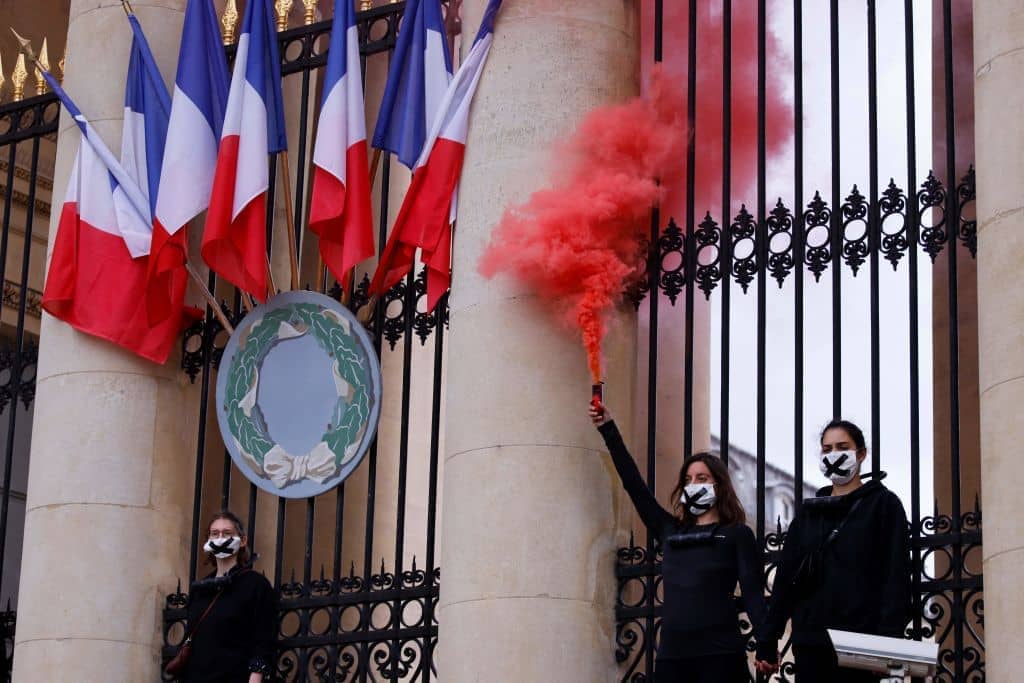In August 1999 a group of protestors demolished a McDonald’s restaurant under construction in Aveyron, southern France. Their leader was Jose Bové, a middle-class farmer, who whipped up his followers by declaring that ‘McDo is the symbol of the multinational who wants us to eat crap and make the farmers die’.
The French regard that summer’s day 23 years ago as the birth of the anti-globalist movement, the progenitor of a multitude of protest groups whose modus operandi has been direct action. Bové subsequently went into politics, representing the Green party in the European parliament between 2009 and 2019.
Today he is retired but his example continues to inspire radical environmentalists. This year alone there have been a succession of stunts, or attacks, depending on one’s point of view, carried out by groups claiming to act for the good of the planet.
Last week golfers in the Toulouse area arrived at their clubs for a round to discover that activists from Extinction Rebellion had vandalised greens and poured cement into holes, a sabotage that was replicated in Limoges at the weekend, although on this occasion vegetables were planted in the holes.
In July dozens of 4×4 cars across France had their tyres deflated by environmental warriors, who posted footage of their handiwork on social media, blaming the state for ‘letting the rich drive their tanks into our future.’
The new generation of eco warrior believes that direct action and not democracy is the best way to achieve its objectives
In the same month the Tour de France was interrupted by protestors from Dernière Rénovation, a splinter group of Extinction Rebellion. Its members were also responsible for blocking the Paris ringroad in May and disrupting the French tennis Open when a woman who called herself Alizée chained herself to the net during the men’s semi-final. ‘There will be no tennis in ten years,’ said Alizée. ‘I wanted to open viewers’ eyes to the reality that we’re all going to die if we don’t do something about the climate crisis.’
Like its counterpart across the Channel, Insulate Britain, Dernière Rénovation advocates a campaign of ‘civil disobedience’ in trying to force governments to install insulation in all social housing by 2025.
Alizée’s motivation was different to José Bové’s but what they share is an unshakeable self-righteousness; no matter that their actions lack widespread support – that is only because the masses are too stupid to understand the gravity of the situation.
The same applies to those who in recent years have burned down chicken farms and vandalised butchers’ shops, as well as the 50 Extinction Rebellion activists who in March this year hijacked a train in Brittany. They did so because they believed it was transporting genetically modified foreign-grown soya. In fact, what they poured onto the tracks was French wheat, a cereal that has become precious in the wake of Russia’s war with Ukraine.
In 2018 an Islamist extremist murdered a butcher during an attack on a supermarket in the south of France, one of several victims killed in the incident. Most of France was outraged by the atrocity, but not a vegan activist, who wrote on Facebook: ‘Does it shock you that a murderer [the butcher] gets killed by a terrorist? Not me, I have zero compassion for him, there is justice in it.’
There is a commonality between extremists of all stripes; the leaders are usually middle-class and well-educated, seized by zealotry and possessed of a contempt for those who don’t share their beliefs. They will not enter into dialogue with their adversaries whom the the greens call ‘deniers’.
In France at least the Greens do have significant political representation though; they are part of the left-wing NUPE coalition that has 131 MPs in the National Assembly and several cities – such as Lyon, Bordeaux, Grenoble and Strasbourg – are run exclusively by Green mayors. But the new generation of rank-and-file eco warrior believes that direct action and not democracy is the best way to achieve its objectives.
José Bové failed to drive McDonald’s out of France. A report published earlier this year disclosed that only Americans, among the world’s 18 to 35-year-old generation, are more devoted to McDonald’s than the French – with 51 per cent visiting the fast-food restaurant at least once a month. Bové said he was not surprised by the findings but made it clear his protest days are over: ‘I’m not going to lead the fight to impose what people will eat’.
But there are others in France who will. In Lyon last year the Green mayor withdrew meat from the menu in school canteens, a decision that caused uproar. It returned one day a week later in the year, but as of next month schoolchildren in the city will no longer have the option of eating Cordon Bleu because the mayor considers the dish ‘the spearhead of ultra-processed food products’.
In France it is not just freedom of expression that is under attack, it’s the freedom to eat what one wants and even the freedom to play golf on a summer’s day.







Comments